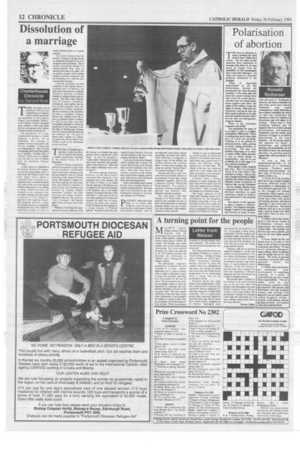Page 12, 26th February 1993
Page 12

Report an error
Noticed an error on this page?If you've noticed an error in this article please click here to report it.
Tags
Share
Related articles
A New Dawn For The People Of Malawi
Malawi Votes For Democracy As Bishops 'postpone' Feast
Bishops In Hiding After Death Threats
Bishops In Malawi Not Arrested
Malawi Turns On Priests
A turning point for the people
Letter from Malawi
ALAWI'S Catholic bishops evoked a frenzied response from the government last year when they wrote a letter publicly condemning human rights abuses within the country. Last Sunday, they issued another one on the forthcoming referendum. The letter entitled Choosing Our Future was read out in all 130 Catholic parishes and describes the referendum as "historic" and a "turning point" in Malawi's history.
The referendum originally planned for 15 March but now extended to 14 June allows Malawians over 21 years to choose either to adopt a multi-party system or retain the one-party state they have lived under for the last 28 years. The government-run radio and newspaper refuses to allow the opposition to campaign and only presents arguments in favour of the one-party state. This has created confusion in the rural areas about what a referendum is and prompted the bishops to explain in their letter the advantages and disadvantages of both systems. While encouraging everyone to vote the bishops stress their neutrality: "The church does not and will not tell people how they are to vote."
The bishops describe the present atmosphere in Malawi as "a time of mixed feelings feelings of hope and excitement but also of fear." While welcoming President Banda's decision to allow the country's first-ever referendum to take place, the bishops are afraid that it may not be fair or free. So far, preparations for the referendum show a strong bias in the government's favour.
President Banda has ruled Malawi since independence in 1964. He is determined to prevent the opposition gaining popularity by imposing measures to hinder their campaign. The two opposition groups claim increased support in rural and urban areas. But an extract from a letter recently smuggled out Of Malawi highlights how determined the government is to win: "Everything is being clearly orchestrated. First the meeting with traditional leaders and Chiefs. They have been told they will be the first to be removed if the dissidents win. Then they move onto the village people and the schools."
Keeping a tight rein on growing opposition demands is not the only problem for the government. Over one million Mozambican refugees are still in the country and the government is trying to cope with a spate of unprecedented armed robberies. If the first bishop's pastoral letter was a catalyst for what has happened in Malawi during the last year. this second one is likely to heighten tensions.
The pastoral letter is unlikely to be received in the same frenzied way as the last one, when the bishops were interrogated and some Malawi Congress Party officials wanted to have them killed. The government's disdain for dialogue could make the referendum on 14 June a definite turning point. But in the wrong direction.
Trevor Cullen
blog comments powered by Disqus













